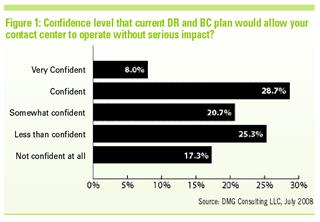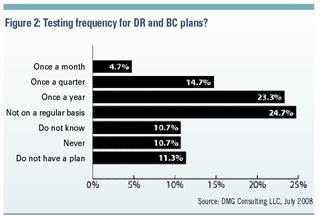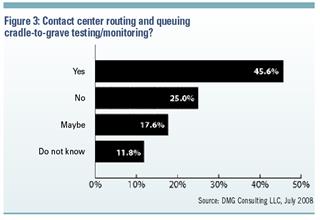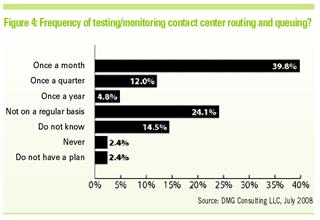A Disaster Waiting to Happen?
In a July 2008 survey of 187 end-user organizations on the topic of contact center disaster recovery (DR) and business continuity (BC), DMG Consulting found that the majority of contact centers are at risk of avoidable failures and disruptions. Surprisingly, only 36.7 percent of companies are confident that they can operate without serious impact on service quality and the customer experience during a disaster. This is because most contact centers either do not have a disaster recovery and business continuity plan, or are not keeping it up to date. Only 4.7 percent of companies test their DR and BC plans on a monthly basis. This leaves 95.3 percent of contact centers at risk of a severe meltdown in an emergency situation. (See Figures 1 and 2.)


Even more worrisome, only 45.6 percent of companies test or monitor their contact center’s routing and queuing capabilities at all. Of these companies, only 39.8 percent test or monitor monthly. This means that 60.2 percent of companies are not routinely testing their core contact center infrastructure. This leaves them open to unexpected but avoidable failures. And, when contact centers implement a new or enhanced solution, only 49.7 percent are confident that the new capability is thoroughly tested and will not disrupt their operations. (See Figures 3 and 4.)


These numbers point out that too many contact centers of all sizes, around the world, are not taking appropriate actions to minimize the impact of disasters or even system and process changes in their own environments. Planning, combined with limited investments in disaster recovery, business continuity, and ongoing internal testing and monitoring, can greatly reduce the risk and impact of failures.
Donna Fluss (donna.fluss@dmgconsult.com) is founder and president of DMG Consulting LLC, the leading provider of contact center and analytics research, market analysis, and consulting. To obtain a free copy of this disaster recovery/business continuity report, visit http://tinyurl.com/4fan4y.
Every month, CRM magazine covers the customer relationship management industry and beyond. To subscribe, please visit http://www.destinationcrm.com/subscribe/.
Related Articles
Top 10 Contact Center Goals
01 Mar 2009
The contact center is part of a larger organization—and its goals must reflect that.
The High Quality of Quality Management
01 Oct 2008
New solutions continue to make an impact inside and outside the contact center.
The Calm Before the Business Storm
09 Sep 2008
New research from DMG Consulting finds one out of every five contact centers is without a plan for business continuity or disaster recovery.
Hold On to Your Customers
01 Aug 2008
Why the contact center may be your last line of defense.
The Contact Center Identity Crisis
01 May 2008
You are who you talk to.
2008 Contact Center Challenges
01 Feb 2008
Before managers can tackle primary goals, obstacles must be overcome.
Considering Offshore Sourcing? Take Time to Do It Right
09 Aug 2004
For companies that have not committed to the siren call of offshore sourcing, advice from those organizations that have tried and thrived can be summarized as, Take time to do it right.
Home Bodies
01 Jan 2007
Cut contact center operating costs, reduce churn rates, and up flexibility--a serious look at the at-home agent model.
Wireless: Hot or Not?
01 Jul 2006
Devices and platforms and applications abound--here's what you need to pay attention to
Offshore Call Center Activities
01 Jan 2007
Managing the risk.
Remote Resolution Finds Business Continuity
29 Aug 2006
Business continuity, security concerns, and the expanding mobile workforce are the main drivers behind the projected growth of the remote access services market.
Planning Ahead for Data Disaster
21 Nov 2000
In the age of e-business, anything that interrupts your data systems can spell disaster--from acts of nature to human interference to mechanical failure. So advance planning is more important than ever.